|
|
|
Sort Order |
|
|
|
Items / Page
|
|
|
|
|
|
|
| Srl | Item |
| 1 |
ID:
187731


|
|
|
|
|
| Summary/Abstract |
Third-wave democracies have massively adopted mechanisms of judicial review, notably constitutional courts, considered key institutions of successful democratic transitions. By preventing abuses of the constitution and safeguarding people’s rights, they act as a bulwark against the claims of potential autocrats. In Thailand, the 1997 democratic transition led to the adoption of a powerful constitutional court tasked with safeguarding democracy from the threats of populism, corruption, and authoritarianism. Yet since its inception, the court’s record has been puzzling. It has dissolved most, if not all, of the pro-democracy, anti-military political parties, dismissed all elected prime ministers, and paved the way for two military coups. In short, against established theories linking constitutional courts to democratization, the introduction of constitutional review in Thailand has led to democratic breakdown. To make sense of this puzzle, this article will investigate three variables of the court—strategic interests, ideologies, and institutional design—within the larger bureaucratic structure of the Thai state, to account for the anti-democratic behaviour of Thailand’s Constitutional Court. This piece considers materials in Thai and English.
|
|
|
|
|
|
|
|
|
|
|
|
|
|
|
|
| 2 |
ID:
187730
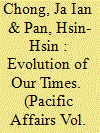

|
|
|
|
|
| Summary/Abstract |
Two trends have become increasingly apparent from public opinion polls in Taiwan and Hong Kong over the past decade. One is a growing identification with and confidence in being exclusively Taiwanese or Hong Konger. The other is increasing public support for democracy. Existing research investigates the association between local identity and democracy, but does not address the meanings people in Taiwan and Hong Kong ascribe to their identities. This limits a fuller understanding of the relationships and driving forces between and behind these trends. One interpretation is that demands for greater democracy mask growing nativism, even xenophobia. An alternative one is that heightened local identification reflects aspirations for greater political participation and restraint on executive authority in Taiwan and Hong Kong. Using discourse analysis collected through the Making Identities Count in Asia project, alongside polling data, we submit that elite and mass discourse reveal an integration of democratic expectations with local identity and its broadening appeal in Taiwan and Hong Kong. People in these two societies take principles associated with democracy to be closely tied to their sense of identification and locality. Such ideas do not eschew the value of tradition rooted in local experiences and can outweigh economic growth. However, Hong Kongers and Taiwanese have come to identify substantively more with democracy than the exceptionalism implied in “localism,” “Asian values,” or some form of nativism. PRC attempts to appeal to local concerns in Taiwan and Hong Kong need to grapple with either meaningful respect for democratic aspirations or effectively repressing them. PRC insistence on the erasure of such values will likely result in continued tensions with Taiwan and Hong Kong, and include mass resistance and the need for force, even violence.
|
|
|
|
|
|
|
|
|
|
|
|
|
|
|
|
| 3 |
ID:
187733
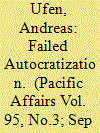

|
|
|
|
|
| Summary/Abstract |
Malaysian Prime Minister Najib Razak’s systematic strategy of autocratization backfired. This paper is based on a model of three pillars of authoritarian regimes. It traces the different strategies and measures employed to weaken the opposition and shows that major survival strategies were prone to frequent shifts. At the beginning of his tenure, Najib depicted himself as a reformer, and refined some forms of repression. The regime scrapped central coercive tools such as the Internal Security Act, but later replaced them with kindred, yet ineffective measures. Co-optation was more centralized and “money politics” expanded. The widespread and unprecedented usage of patronage resulted in corruption, which fundamentally destabilized the regime. Legitimation was modified since 2013 to a more Malay-centric and Islamist discourse. Because of this shift, legitimation eroded among ethnic and religious minorities. The prime minister’s legitimacy shrank due to corruption scandals. This paper helps gauge the lacking complementarity of the pillars and the failures of an authoritarian regime in crisis, which is important also with a view to political developments in Malaysia since 2018.
|
|
|
|
|
|
|
|
|
|
|
|
|
|
|
|
| 4 |
ID:
187727
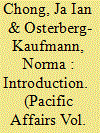

|
|
|
|
|
| Summary/Abstract |
A growing global trend towards authoritarianism has left democracy, especially its liberal form, under strain. This has occurred despite earlier promises of democratization between the end of the Cold War and the early twenty-first century. Our essay examines how the dynamics of post-democratization politics have played out across several polities in Southeast and Northeast Asia. These regions once included supposed “third wave” democracies and polities apparently on the cusp of political liberalization. Such expectations have not panned out. Instead, the region has generally witnessed either significant authoritarian resilience or autocratic resurgence following spurts of political openness. We examine how such autocratic dynamics have played out following earlier movements toward democratization. Specifically, we identify three key elements of post-democratization politics associated with autocratic success and democratic robustness based on contributions to this special issue, and suggest pathways through which they can affect political outcomes.
|
|
|
|
|
|
|
|
|
|
|
|
|
|
|
|
| 5 |
ID:
187734


|
|
|
|
|
| Summary/Abstract |
Social media played a significant role in the 2022 Philippine national elections. Using various empirical sources, including an original pre-electoral survey, we argue that social media was critical in the production, transmission, and reception of election-related information and narratives that resulted in offline and online polarization and mobilization of Filipino voters in the 2022 elections. This article discusses the role of social media in electoral politics in the Philippines relative to other factors, such as material incentives for political partisans, prior voting behavior patterns, information consumption, and long-standing grievances. We discuss how these factors inform social media’s role in mobilizing and polarizing the Philippine electorate. We also unpack the leading disinformation narratives of authoritarian nostalgia, conspiracy theory, strongman leadership, and democratic disillusionment, which fueled support for Marcos Jr. and undermined the other candidates. In conclusion, this article discusses the implications of disinformation in the 2022 elections for the post-electoral political engagement of Filipinos and its contribution to the further political dysfunction of Philippine democracy.
|
|
|
|
|
|
|
|
|
|
|
|
|
|
|
|
| 6 |
ID:
187732
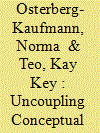

|
|
|
|
|
| Summary/Abstract |
Democracy is subject to constant and seemingly interminable contestation in academic and policy contexts, and yet, empirically and methodologically robust analysis of what the term means in practice for actual citizens has remained an area of relative lacuna. Admittedly, large-N surveys have attempted to address this research gap by examining attitudes to numerous components of democracy, but without the fine-grained detail required to overcome simply reproducing the focus on liberal procedural, Western precedent-based, top-down approaches to understanding such a complex and varied political system. This article proposes a methodological approach, based on the requirements of comparative political theory and research into how people view democracy. This allows us to explore political attitudes and the meaning of democracy with a bottom-up approach using the methods of repertory grid and in-depth interviews. Singapore is a particularly exciting case for comparative political science: although it has all the advantageous conditions that, according to classic modernization theory, promote the development of democracy, it is still not a democracy.
|
|
|
|
|
|
|
|
|
|
|
|
|
|
|
|
| 7 |
ID:
187735
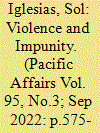

|
|
|
|
|
| Summary/Abstract |
As president from 2016 to 2022, Rodrigo Duterte captured the judiciary, dominated the legislature, attacked the media, and presided over a campaign of mass killing, leaving an estimated 30,000 alleged drug criminals dead. Despite wielding vast amounts of power, Duterte stepped down after the national elections on May 9, 2022 in a largely peaceful transfer of power to Ferdinand Marcos Jr., son and namesake of the former dictator deposed in 1986. Why did Duterte amass power without causing full democratic collapse into authoritarian rule? The Philippines experienced backsliding to competitive authoritarianism: while elections remain free and somewhat fair, other features of democracy like civil liberties and political freedoms have eroded badly because of mass violence. The Philippine case demonstrates the autocratizing effect of an emerging form of political violence: a focused campaign of state terror that produces fear and electoral success. I present evidence from two cases—the national “war on drugs” and its local antecedent in Davao City—to explain how violence escalates, provokes accountability, evades culpability, and contributes to democratic backsliding without immediate collapse to authoritarianism. With the election of Marcos Jr., the impunity of the former incumbent is likely to become institutionalized, and democratic backsliding is unlikely to be reversed.
|
|
|
|
|
|
|
|
|
|
|
|
|
|
|
|
|
|
|
|
|